PROJECT REPORT
The Smoke Signals Radio Show Archive Project: An Introduction
Paulette Rothbauer
Faculty of Information & Media Studies, Western University
Amy Hadley
Faculty of Information & Media Studies, Western University
Marni Harrington
Faculty of Information & Media Studies, Western University
Heather Hill
Faculty of Information & Media Studies, Western University
Serena Mendizabal
Indigenous Studies & Faculty of Information & Media Studies, Western University
Danica Pawlick-Potts
Faculty of Information & Media Studies, Western University
Dan Smoke
Natural Laws, Noble International Environmental Peace University; Indigenous Studies Department, Western University
Mary Lou Smoke
Natural Laws, Noble International Environmental Peace University; Indigenous Studies Department, Western University
In this multimedia report we introduce our ongoing collaborative archival project to organize, describe, and provide access to digitized audio files from the long-running Indigenous radio broadcast called Smoke Signals, produced and hosted by Indigenous activists, community leaders, educators, and Elders Dan Smoke and Mary Lou Smoke.
Keywords: Indigenous; First Nations; radio; digital archives; Dan Smoke; Mary Lou Smoke; Smoke Signals Radio Show
How to cite this article: Rothbauer, Paulette et al. 2021. The Smoke Signals Radio Show Archive Project: An Introduction. KULA: Knowledge Creation, Dissemination, and Preservation Studies 5(1). https://doi.org/10.18357/kula.131
Submitted: 03 July 2020 Accepted: 26 November 2020 Published: 22 June 2021
Copyright: @ 2021 The Author(s). This is an open-access article distributed under the terms of the Creative Commons Attribution 4.0 International License (CC-BY 4.0), which permits unrestricted use, distribution, and reproduction in any medium, provided the original author and source are credited. See http://creativecommons.org/licenses/by/4.0/.
The Smoke Signals Radio Show Archive Project: An Introduction
In this multimedia report we introduce our ongoing collaborative archival project to organize, describe, and provide access to digitized audio files from the long-running Indigenous radio broadcast called Smoke Signals, produced and hosted by Indigenous activists, community leaders, educators, and Elders Dan Smoke and Mary Lou Smoke.
Our project began in November 2018, when we were invited to examine some cardboard boxes filled with audiotapes belonging to the Smokes—audiotapes that capture nearly thirty years of radio shows featuring interviews with several notable Indigenous artists, musicians, writers, scholars, spiritual leaders, and politicians. The first episode of their radio newsmagazine show aired on CHRW 94.7 Radio Western in 1991. Smoke Signals is still broadcast every other Sunday from 6:30 to 8:00 p.m.
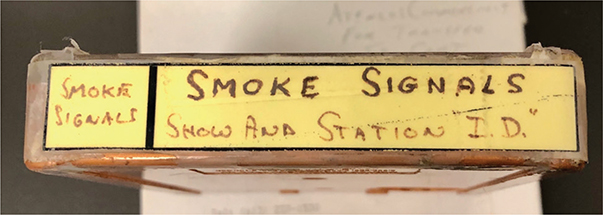
Figure 1: Smoke Signals Show and Station “I.D.” Photo courtesy of Smoke Signals Radio Show Archive Project.
Who Are the Smokes?
It is difficult to capture the biographies of Dan Smoke and Mary Lou Smoke. They have been active in activist and arts circles for decades, and they show no tendency to slow down. They have had a ubiquitous presence at community events, political rallies, memorial vigils, and arts festivals spanning the nearly thirty years between the Mohawk Resistance of 1990 and the recent walkout at Western University to express solidarity with Wet’suwet’en hereditary chiefs’ fight against a proposed natural gas pipeline project in British Columbia.
Dan Smoke (Killdeer Clan) is a member of the Seneca Nation of the Haudenosaunee Confederacy. He has been the president of the Board of Directors for the Native News Network of Canada and served on the executive for the Native Journalists’ Association of Canada. He was Co-Chair of the 2019 CARAS JUNO category of the “Indigenous Artist and Group of The Year” committee. Both he and Mary Lou Smoke have served as committee members or judges for CARAS since 1994. Dan Smoke also served on the Ceremonial Protocol Committee for the Canada 2001 Summer Games.
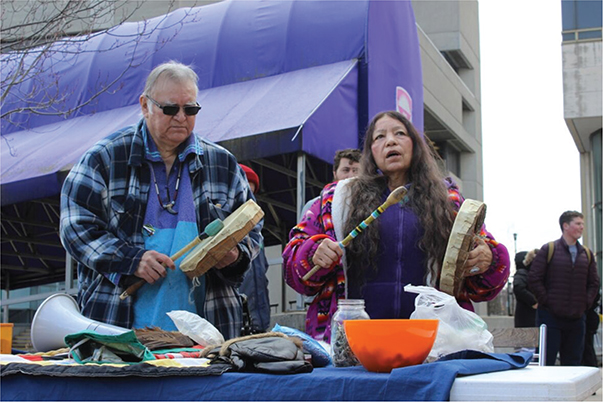
Figure 2: CBC London News photo of the Smokes at a Western protest. Photo reproduced by permission of Liny Lamberink/CBC London.
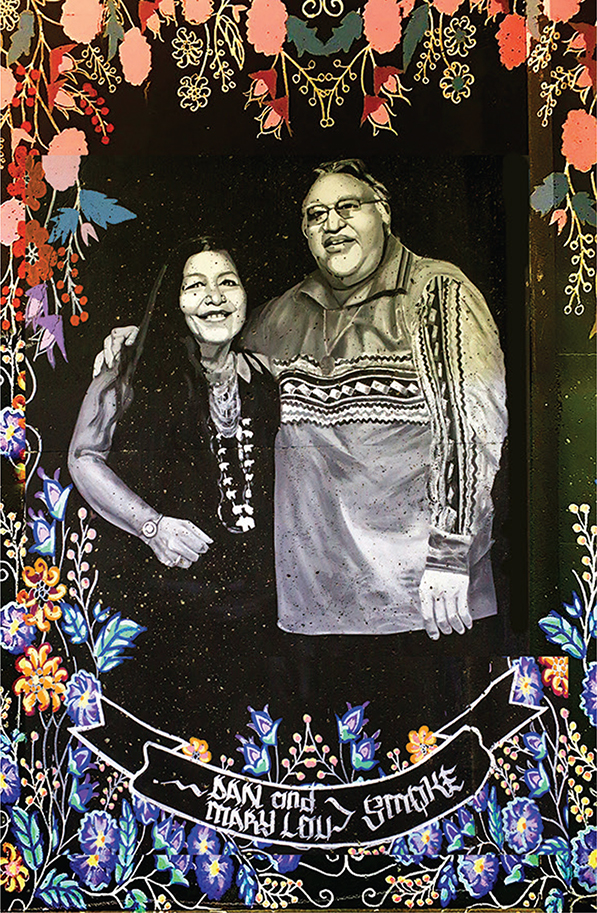
Figure 3: Painting of Dan and Mary Lou Smoke included in Tannis Neilsen’s Simcoe Street Mural Underpass Project. The western wall, entitled “N’ gekaajig kidowog – My Elders Said,” is dedicated to twenty-eight local Elders and cultural knowledge holders who live/have lived in Toronto. Photo by Tannis Neilsen.
Mary Lou Smoke (Bear Clan) is a member of the Ojibway Nation. She is a singer, songwriter, writer, guitarist, and traditional drummer. She plays original compositions and has performed in local, national, and international venues, including at local powwows, at Aboriginal music festivals, and at the 1976 Olympics. She is the founding member of a local drumming group, Ogitchidaw Kwe Wag Singers, and through this group she contributes to the healing and well-being of Indigenous and non-Indigenous women. In 2019, Mary Lou Smoke was recognized with a prestigious Lifetime Achievement Award by the Forest City London Music Awards. She is also a recipient of the YWCA of Western Ontario Women of Distinction Award, category of Education and Culture, awarded in 2013.
The Smokes are respected Elders. They have conducted many dozens of opening and closing ceremonies at a wide range of community and educational events. They are Visiting Elders at several post-secondary institutions and work with many other organizations and community agencies offering ceremonial protocols, traditional teachings, and cultural workshops.
For several decades, Dan Smoke and Mary Lou Smoke have worked to enhance intercultural understanding, healing, and reconciliation, and to build better relations among Indigenous and settler communities in London, Toronto, and their surrounding areas, including the territories of the Chippewas and Oneida of the Thames and of the Munsee-Delaware Nation. This area of southwestern Ontario covers traditional territories of the Anishinaabek, Haudenosaunee, Lūnaapéewak, Attawandaron, and Wendat peoples.
One of the Smokes’ most visible roles is as the radio producers and hosts of the award-winning and longest-running First Nations radio newsmagazine show in Canada, Smoke Signals. This weekly broadcast constitutes a cultural site of enormous significance as one of the most constant venues for Indigenous voices directly sharing perspectives on Indigenous experience.
What Is Smoke Signals?
The enduring significance of Smoke Signals cannot be overstated. The show grew from fifteen minutes to two hours, and for many years it was one of very few First Nations media programs reporting to and for Indigenous communities in southwestern Ontario (Buddle 1993, 117). In those early shows, you will hear Dan Smoke tell listeners, “This is Smoke Signals First Nations Radio helping to bridge the cultural gap between Aboriginal and non-Aboriginal communities. It’s our turn to speak now. It’s our turn to be heard” (Mary Lou Smoke, cited in Buddle 1993, 170).
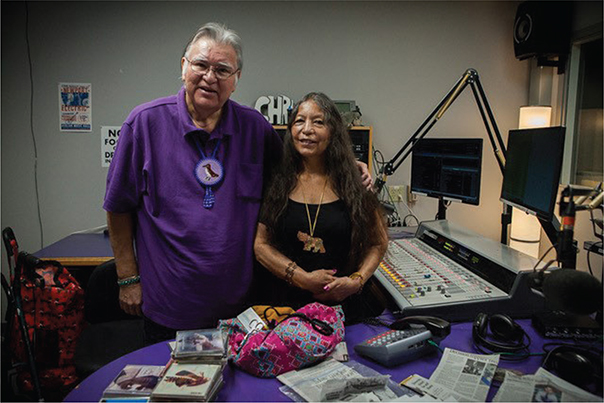
Figure 4: The Smokes in the CHRW broadcast studio, 2018. Photo by Molly Miksa.
The show creates a welcoming and inviting place on the air for listeners to learn about and to share perspectives on matters of interest and importance to Indigenous people. The format of the show has varied but always begins with an opening song, greetings in multiple languages, and then moves to discussion of news and local events. The show includes live or pre-recorded interviews, sometimes with guest hosts, interspersed with music and teachings. Smoke Signals was one of the first venues to provide regular airtime for Indigenous music and musicians. Over the years, the show has featured First Nations leaders from London and other parts of Canada and the United States, musicians, artists, writers, film-makers, activists, educators, and students.
What Is the Smoke Signals Radio Show Archive Project?
Our small team is made up of First Nations, Métis, settler, and settler-immigrant members, and we have varied backgrounds as students, educators, librarians, and researchers. The Smokes are key collaborators whose insights and ideas provide essential guidance on the direction of the project. With support from the Faculty of Information & Media Studies, Social Sciences, and Indigenous Studies at Western University, our team has been working with an inventory of over five hundred audiotapes, organizing and describing the cassette sleeves, cases, and other physical trace elements.
The audiotapes have been digitized and, at the time of writing, we are listening to the tapes, transcribing, and beginning to describe and contextualize their contents. As we do this work, the Smokes will provide contextual notes and comments on the digitized audio. Our goal with the project is to create an open-access database of audio content related to the radio show, with plans for an integrated media site as a living archive for all things Smoke Signals.
Part of the work of creating this archive involves conducting interviews with members of the research team as we aim to capture perspectives and reflections on the work while it is in progress. We give an example of this in the audio clip and excerpt1 below, taken from an interview conducted by Amy Hadley with Danica Pawlick-Potts (both are graduate students working on this project). Danica describes the careful process of transcription and how the process of thinking through the importance of these materials begins right away with the introductions.
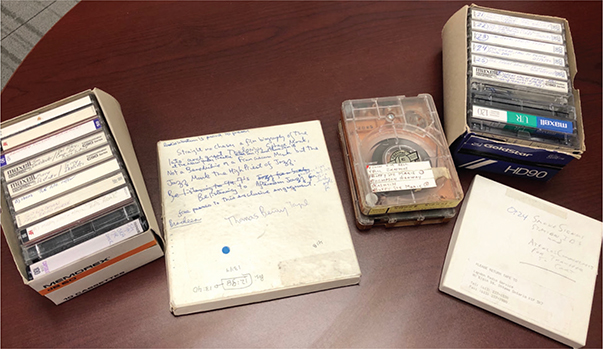
Figure 5: A variety of audio formats from Smoke Signals archival materials. Photo courtesy of Smoke Signals Radio Show Archive Project.
AMY. So when you started that careful listening and that transcribing, what was that like? How would you describe that experience?
DANICA. It’s surprisingly difficult right off the bat because with the introductions there’s often the use of a lot of different Indigenous languages. So I’m trying to transcribe that and figure out what those languages are. The ones that I wasn’t familiar with was definitely a little bit challenging. . . . It’s really kind of represented how there’s so much there in those tapes . . . that is new or that you have to be careful with to try to really represent what’s happening there, that there’s these different languages, and these different Peoples. And it was really important to me, and to us, to kind of be respectful and identify those correctly, and not just kind of just gloss over it. . . . I think that that process, of doing that close listening for transcription, really lends itself well to the spirit of things because it reflects the idea of oral tradition and oral histories and that storytelling that is so prevalent in Indigenous cultures. Most of the guests are Indigenous people so they tend to kind of engage with it that way as well and tell those stories, and so through that transcription process, you really engage and listen closely to what they are saying and try to get as much out of it as you can. . . .
AMY. . . . I’m imagining you must have had thoughts, reactions as you were listening and listening, as you say, to what they’re really saying. Is there a moment that stands out to you . . .?
DANICA. . . . Something that was very common while I was doing it, was that they would be talking about something or some kind of event, and I would just want to go look it up to learn more about it. . . . Pretty much everything they were talking about, every guest has something really interesting, and then they’re giving you this snapshot that really draws you in. So, yeah, often it was just curiosity to want more than what was there.
(Smoke Signals Radio Show Archive 2020)
Why Does This Project Matter?
The radio show archive represents intersections of Indigenous broadcasting, storytelling, and activism. The digitized shows provide access to new listeners, Indigenous and non-Indigenous alike; put listeners in dialogue with the past, potentially through the lenses of present-day activism and social justice movements; and have the capacity to deepen our collective understanding of the trauma and violence of settler-Indigenous relations. But the digitized archives also allow for a joyful engagement with Indigenous arts, music, politics, and culture.
Serena Mendizabal, one of the student research assistants working on this project, had this to say about what it has meant to meet Dan and Mary Lou and to learn about Smoke Signals: “Hearing these tapes and stuff, it’s really empowering me right now because they were going through the same thing we’re going through right now thirty years ago,” she said. “It really connects you so much more because you know that this has been something decades in the making and our resilience is decades in the making” (Smoke Signals Radio Show Archive 2020).
We feature two excerpts—one from Mary Lou Smoke, from a letter read on air for International Women’s Day in 1992, and one from Dan Smoke, from the 2004 New Year’s show. Both excerpts confirm the enduring themes of the show—centering Indigenous voices and perspectives, educating settlers and non-Indigenous listeners, promoting intercultural understanding to combat racism, intolerance, and bigotry, and to make a better world for future generations:
We are the women of the First Nations who have come together to address our Aboriginal and non-Aboriginal sisters on this day, March 8, 1992, International Women’s Day. We are not political representatives. We speak on behalf of no one, but for today we are here to share one voice, one vision, as Aboriginal women. Today our non-Aboriginal Canadian sisters come here to honour the Aboriginal women of this land and their struggle to survive the past five hundred years. . . . We believe if recognition is due, it is not ours to accept. We will join you, however, on this day to honour our mothers, our grandmothers, and our great-grandmothers. If not for their strength and their vision we would most certainly not be here today sharing this opportunity with you to honour them. . . . We also ask you to join us in honouring our grandmothers and great-grandmothers who survived the residential schools and their blatant policies of cultural genocide. Further, we believe that this honour must be extended to our foremothers and forefathers who placed their trust in the Creator as they signed away their birthright to help preserve a place upon this land for their future generations. Today, we as Aboriginal women face another great challenge. That is the challenge to heal ourselves, our families, and our communities as we continue the struggle of our forefathers to correct the injustices that have shattered our communities. We, as Aboriginal women today, share in this role, this commitment, as we resume our rightful place within the circle to restore the natural harmony, balance, and the beauty of the Nations. Our grandmothers tell us that we are one half of the Great Circle of Life that forms our communities. Without us that circle is incomplete and imbalanced. To our Aboriginal sisters, our vision of equality may be different from yours. Our role as women of the First Nations may not be the same as your role as in your Nation. . . . We do not ask for your acceptance. We only ask for your respect. In return, we shall share with you our knowledge and our understanding of this beautiful land and its Aboriginal people. (Mary Lou Smoke, Smoke Signals Radio Show, March 14, 1992; also cited in Buddle 1993, 127).
Dan covers similar ground—Indigenous worldviews and representations, enlightenment, empowerment, education, solidarity, harmony and balance:
So we’re looking at about twelve and a half years at this present time that we have been sharing with you the journey, the perspective, the worldview of the First Nations people through our own eyes, through our own perspective . . . using our own image, the way we construct the image. The representation that we want ourselves represented, not the way the mainstream public or the mainstream media portray us, but the way we want ourselves to be portrayed. That is our mission, that is our mission here at Smoke Signals, First Nations radio, and we are very grateful to Radio Western CHRW 94.9 FM for helping us to share our voice. Share our voice of understanding. To enlighten the public, empower the public with our culture in our life. So that we promote that, that understanding, that public education, so that we bridge the gap of understanding between First Nations brothers and sisters and our relatives, our brothers and sisters from the four directions. So we’re very grateful for this opportunity to come in here every Sunday night from 6:00 o’clock to 8:00 o’clock to share with you a little bit about this journey that we’re on, that we’re all on together, and to help promote understanding along the way. Solidarity, so that we can support one another, so that we can actively construct an understanding of balance and harmony about how we can coexist side-by-side, together, as we journey into the future. Because it will be our future generations who will benefit from the actions that we take in this generation today. It will be the future generations. It is for them that we are making these initiatives. It is for them that we are promoting understanding. It is for them, so that they will not have the intolerance, the racism, the bigotry that we experience in our lives. They will not have to experience that because we are all, we are all part of the one race of human beings. (Dan Smoke, Smoke Signals Radio Show, January 4, 2004)
Next Steps
To date, four students have been part of the building blocks of the archive. One of our MLIS students, experienced in website development and metadata creation, helped to ensure that the archival website was designed for good quality audio download and easy navigation. Two Indigenous students from the Faculty of Information and Media Studies (FIMS) have engaged hands-on with the materials. Finally, a current Master in Library and Information Science (MLIS) student with a background in journalism is interviewing all research collaborators, along with Mary Lou and Dan Smoke, to showcase who we are, where we are from, and why we are here.
As the Smoke Signals Radio Show Archive Project moves into its second year, we will continue to work with students from FIMS programs—information and library science, media, journalism, and communication—to provide them with access to technical and research skills related to digital archiving, archival description and classification, open-access databases, interviewing, transcription, contextual research, and analysis. The project is also a site for essential learning and reflection on Indigenous media production and broadcasting, especially when contextualized against colonialist and racist ideologies and with the rise and recognition of autonomous Indigeneity. We will continue to work with and learn from the Smokes, drawing on their deep histories and unique expertise as observers, commentators, and producers of Indigenous media, and we will establish a public web space to showcase the project and to provide access to the digitized and transcribed materials. By revisiting the Smoke Signals Radio Show broadcasts from the past, we hope to offer a current place to demonstrate the power of Indigenous voices heard through storytelling, activism, news events, and entertainment, while honouring the ongoing work of Dan and Mary Lou Smoke.
References
Buddle, Kathleen. 1993. “‘No Walls Can Contain It’: Experience and Expression in First Nation Environs.” MA Thesis, University of Western Ontario.
Smoke Signals Radio Show Archive. 2020. “Student Researcher Profile: Serena Mendizabal.” Accessed June 29, 2020. https://archive.fims.uwo.ca/smokesignals/profile-of-serena-mendizabal. Archived at: https://perma.cc/XZ87-JSLL.
Footnotes
1 This excerpt has been edited for brevity and readability. Ellipses indicate omitted text.